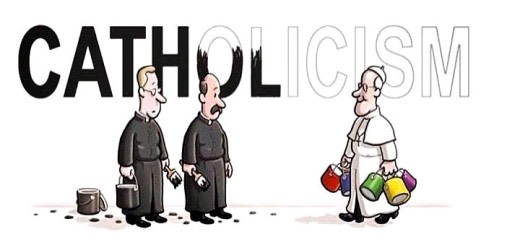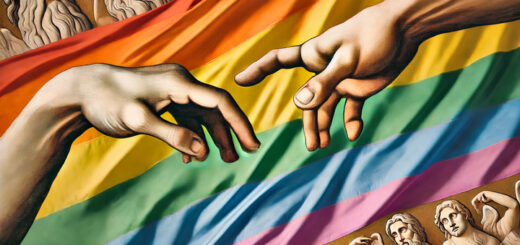Is the gay lobby in the Vatican exactly as it is described?
 Article by Andrew Brown, Kate Connolly and Lizzy Davies taken from the Guardian website (Great Britain), 31 July 2013, freely translated by Giacomo Tessaro
Article by Andrew Brown, Kate Connolly and Lizzy Davies taken from the Guardian website (Great Britain), 31 July 2013, freely translated by Giacomo Tessaro
On the return flight from Rio aboard the papal plane known to Vatican experts as Shepherd One, Pope Francis reopened the most pressing issue of his papacy.
Relaxing after the enormous success of the Brazilian tour which culminated in the celebration of a mass that saw the influx of three million pilgrims on Copacabana beach, the pontiff went to the back seats of his plane speaking freely to the amazed journalists on the vexed issue of the Vatican and homosexuality. First he put an end to his predecessors' disgust for the word "gay".
“If a person is gay and seeks the Lord and has good will, who am I to judge him?” Gays should not be marginalized by society, he says before directly addressing the much-discussed issue of the existence of a powerful "gay lobby" in the Vatican.
If such a thing existed, it would not be the greatest form of corruption: “The problem is not having this tendency. They are brothers. In this case the problem is lobbying, lobbying of people with this tendency, but it could be lobbying of misers, of freemasons."
To understand the meaning of homosexuality for the Vatican, one must know that a strong minority of Catholic priests are believed to be gay and that these priests know all too well the catechism teaching that states “Homosexual acts are intrinsically disordered.”
Add to this the Vatican's tradition of discrediting enemies by accusing them of being gay, and the result is a sizable number of closeted gays in positions of authority harboring potentially dangerous secrets. By making homosexual acts a sin, the Church has taken homosexuality from being a simple matter of sexual orientation to residing in the realm of conspiracy and politics.
The problem is made worse by a document prepared by Pope Benedict XVI when he was a cardinal, which appears to force gay priests to hide for life. Despite condemning homosexuality as an attraction to “an intrinsic moral evil,” men who manage to remain chaste for three years probably do not have a “deeply rooted” homosexual orientation. In such an atmosphere it is no wonder that the expression “gay lobby” has become so strong and that almost everyone is suspected of being part of it.
A recent high-profile target of suspicion was the Pope's new personal representative at the troubled Vatican bank, Monsignor Battista Ricca, accused of living openly with his lover during his time as a Vatican diplomat in Uruguay at the turn of the last century. The pope, on the flight back to Rome, said that these accusations were found to be without foundation and that in any case they only concern a sin that God can forgive and not a crime.
This is not an assertion of his authority over the Vatican gossips but also an attempt to treat gay people realistically, as people. These two strategies are closely linked to his struggle to reform the Church and tame the Vatican bureaucracy, known as the Curia.
The English theologian James Alison, himself openly gay, estimates that more than 40% of today's Catholic clergy are gay, but very few of them recognize their homosexuality or are comfortable with it. Other expert observers agree with this figure, but few within the Church speak on the subject.
“The concept of the gay lobby is complex. There are many ways to use the expression,” says Alison. Within the Vatican the expression usually refers to anyone outside the Church who says that being homosexual is normal. Another meaning, Alison says, is related to false notions such as “This so-called scientific teaching is simply the product of a powerful gay lobby.” This shows that the largest and most powerful gay lobby in the Vatican is that of closeted gays.
Veteran Vatican correspondent John L Allen of the National Catholic Reporter believes that the expression, as understood in Italy, has a different nuance than its English counterpart. “If you say 'gay lobby' to the average English speaker, they will think... of an interest group pursuing objectives. But Italians don't mean this when they say 'gay lobby'.
What they think of is a clandestine network of people from the Vatican who have skeletons in the closet, who are trying to track down their peers, and as far as Italians are concerned, these skeletons in some cases have nothing to do with sex. If the question is 'Are there gays in the Vatican?' then yes, of course there are.
But if the question is 'Is there some kind of organized network of gays in the Vatican who protect each other and look after their own interests' then I can tell you that in fifteen years of being there I have never had proof that this exists.”
According to Alison, the concept of a closet gay lobby also proves complicated. “It's a crawl space of closed cabinets. Not everyone knows each other. Everyone knows someone who knows someone else. So there's a whole… blackmail game. The people with the strongest motivation to maintain the present system are those who, perhaps with the best intentions, have opted to "sacrifice" that part of themselves for what they believe is the glory of God.
They find themselves having to constantly repeat that sacrifice for other people, as if the annihilation of the personality was what Our Lord really wants. Their sacrifice is not only in vain, but is a monument to self-destruction, regardless of whether or not the person in question has had partners.”
Another point of view is offered by the German theologian David Berger, who for twenty years was part of Germany's closed traditionalist milieu (Alison notes in passing that the smallest possible Catholic group would be a gathering of traditionalist heterosexual priests). Berger was sued and fired from his teaching job when he came out in 2010 and now runs a gay magazine.
“In Rome I saw that these [gay] networks exist, but not to take power. However, friendship-based nepotism exists in the Vatican. The main purpose of these clubs is simply to have access to sex without having complications. You often pay to have sex, but just as often you don't pay. There is no gay conspiracy in the Vatican.”
Berger has large files of letters from priests, especially from German-speaking countries, in which very complicated stories of homosexuality and priesthood are explicitly told.
One priest was so upset by the blackmail attempts and his guilt that he doused himself in petrol in front of the other priest with whom he was having an affair and set himself on fire. He died, while his surviving companion lives oppressed by a huge psychological burden.
Some observers say that there is a whole generation of older gay priests who live in a less conflictual way. A very high-ranking English Catholic says: “I knew a number of gay priests of that generation, who accepted the Church's teaching on homosexuality without having to face self-hatred.
They did not see homosexuality as central to their identity. They were gay, period. But what was at the core of their being was that they could love, and as fate would have it, some of their deepest experiences of love were for other men.”
This adaptation to a life of chastity, in which sex is of no importance or interest compared to a love that seems to have no need to express itself in sex, certainly still exists, and was recognized by everyone interviewed by the Guardian . But it's not easy in the current era.
“Rome is one of the last places on Earth where 'don't ask, don't tell' has all its meaning,” says Alison. “It's a traditional monosexual culture, just like the British Army was in the 1890s. Women and sex are simply irrelevant.
It doesn't matter what you do as long as you don't get caught and cause a scandal. It is a remarkable cultural survival of a pre-modern world. But the people who live there are modern people. Hence the cognitive dissonance. There are various ways to survive: you can live a double life, with all the pain that entails, or you can choose to suffocate your emotional life and think only about your career.”
We will have to see whether Pope Francis will be able to handle this issue which has become political, a consequence of which is that the accusation of homosexuality remains one of the most common and effective forms of attack. Sometimes things get out of hand.
A traditionalist blogger has branded the archbishop of Vienna, Cardinal Christoph Schönborn, as a "homosexual" for having had kind words towards the gay clergy of his diocese. Similarly, a letter denouncing by name a number of German and Austrian prelates, inside and outside the Vatican, was circulated last year among all German-speaking bishops and the media, including the Guardian.
Many suspect that the prelates move in the gay scene. Some are accused of complicity in the maneuvering around the Vatileaks scandal, in which Pope Benedict's butler was accused of passing detailed personal information to journalists. It seems likely that this letter is part of a dossier presented to Pope Benedict in February by the three cardinals responsible for investigating the Vatileaks affair.
As his conversation on the plane implies, greater honesty in Catholic attitudes toward homosexuality and homosexuals must be part of what Francis was elected to do: reform the Vatican. A gigantic task.
Original text: Pope Francis: gay priests in the Vatican? Yes. A gay conspiracy? No






